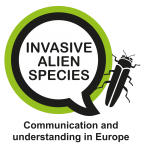Home » Forest Ecosystems Cluster (IAS)
Forest Ecosystems Cluster (IAS)

Introduction to the Forest Ecosystem cluster
Large parts of Europe are covered by forests ranging from boreal forests to temperate forests and Mediterranean forests. Forests are one of the most important ecosystems in Europe as it contains a very high biodiversity and provide many ecosystem services.
However, forests are also important from an economic point of view for wood production. In the last years the forests are under pressure because of climate change with extreme weather events and often cascading outbreaks by pests and diseases. In the last decades, the effects by IAS are becoming more obvious.
Chalara ash dieback swept with great speed through Europe and causes a dramatic decline among ash trees. In certain countries, ash is already on a red list. In addition, the large-scale disturbance in the last decades opens up the forest and make the forest more accessible for IAS. IAS are therefore seen as one of most problematic issues in the future of the European forests.
Aim of Establishing the Forest Ecosystems Stakeholder IAS Platform
The objective of the forest ecosystems platform is to foster a constructive dialogue within and among stakeholder organisations and competent authorities involved in the cluster of pathways (both on “impacting” and “impact” sides) and to develop joint initiatives to address the problem.
- discuss IAS and the required prevention measures related to the cluster of pathways,
- discuss IAS of Union concern and the improvement of the implementation of the prevention measures provided for in the IAS Regulation,
- discuss options for stakeholders involved in the introduction and spread of IAS (cause) which may help them to continue and expand their activities, while reducing the associated risks (e.g. by replacing alien species by native species) and contributing to halting the loss of biodiversity,
- co-operate on the development and joint implementation of an IAS prevention campaign for the aquatic ornamental cluster,
- discuss how prevention and control of IAS can support the objectives of nature conservation in protected areas, particularly in Natura 2000 areas.
The platform is not intended to act as a European Commission “Expert Group” or a similar entity with consultative functions but instead aim to exchange good practice between one another and come up with new ways to deal with IAS.
Role of the Project Team/Platform Secretariat
The team’s role is an advisory neutral third party in support of all the other parties. The solutions will have to be discussed and agreed between the stakeholders. The project team will facilitate this dialogue and provide input from experts on IAS as desired by the participating platform members.
- Neutrality with regard to the issues under discussion. The team would only make suggestions on the process to be followed but this would also be adaptable depending on requests of the participants.
- Equality in supporting every platform member equally in terms of understanding what is important to her/ to him. Considering all viewpoints as being equally valid and taking proper account of knowledge shared from different sources.
- Transparency with regard to the decisions the team makes on the process and the reasons for making them
- Confidentiality with regard to who provides the team with what information. Information gathered (e.g. through interviews) will be reported to the Commission as well as to the other stakeholders involved but no information will be linked to a specific individual.